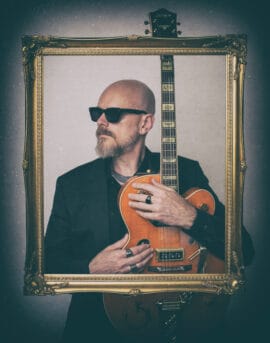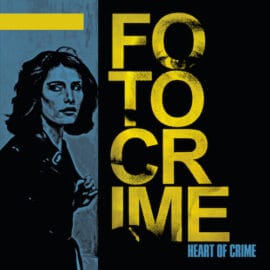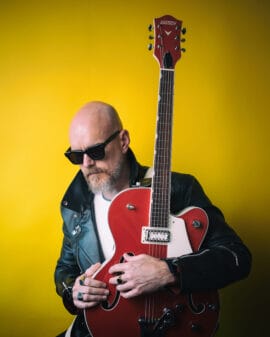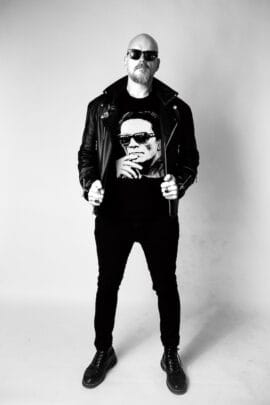Anyone who wants to play post-punk in the year 2021, should definitely take FOTOCRIME as a role model. With „Heart Of Crime“ mastermind Ryan Patterson has created a fantastic record during the Corona lockdown, which not only shows the genre from its best side, but also links it inseparably with related music genres such as EBM and synth-pop. In the following interview, Patterson describes how he coped with having to take on the role of producer for the first time due to the lockdown, why there are so many guest contributions on the album, which he otherwise recorded mostly on his own, and why his music is closely linked to the origins of punk despite its modern sound.

Your music is often associated with post-punk, but has little to do with punk in the strictest original sense. Do you nevertheless consider yourself a punk musician?
I consider myself a punk in general, not only as a musician. My connection to underground art, music, ethics, and community relates to how I define punk as a culture and how it pertains to my work in all realms. The concept of post-punk in the late 1970s was originally about moving beyond some of the reductive traits of early punk, or at least the narrow-minded views of certain punk fans, but not about leaving behind the original concepts of punk. Suicide was arguably the first “punk” band while also being the blueprint for post-punk, so by that gauge, FOTOCRIME has a lot to do with punk in its earliest incarnations. I don’t think about any of this though. I know who I am and my influences, tastes, and creations span whatever moves me, regardless of definition.
With „Heart Of Crime“ you have a new album coming up. It seems to me that you rely more than ever on electronic sounds instead of guitars. How difficult is it to distance yourself from such a genre-defining instrument when it comes to songwriting?
The guitar is my first and primary love; I love playing guitar, I love the sound of it, I love the way it feels in my hands, the way a guitar looks. I certainly have no interest or intention in distancing myself from the guitar. I feel at one with the guitar and, along with my voice, I am able to express myself sonically most with a guitar. I love and appreciate every instrument but I also particularly love certain synthesizers and drum machines. I usually start writing songs with bass guitar, actually, and have enjoyed creating the foundation for a song with bass.
 Rock and punk fans can be pretty narrow-minded and dismissive in that regard. Were you worried that with less emphasis on the guitars your new songs might be less well received by people?
Rock and punk fans can be pretty narrow-minded and dismissive in that regard. Were you worried that with less emphasis on the guitars your new songs might be less well received by people?
I’m not concerned with that. I make music for myself and if others enjoy it then that’s wonderful and I so deeply appreciate it. Of the eleven songs on ‘Heart of Crime’, two are entirely electronic. I think there were two fully electronic songs on my previous album, ‘South of Heaven’, as well. I do what feels right for the song and what moves me.
Not only instrumentally, but also sound-wise, your music sounds much slicker than classic punk records. In your opinion, can amateurishly played instruments and lo-fi productions nowadays still have the same impact as they used to?
I think great songs shine through and production is part of the art. Some of my favorite recent records are raw hardcore records, some of my favorite recent albums are highly produced. ‘Heart of Crime’ was made by me at home, I recorded it and mixed it all myself, it’s an entirely DIY album and recording but intentionally not low fidelity.
You released a music video for the track „Delicate Prey“ in advance. With its bright colors and clean, even promotional shots, the clip seems to contradict the music, which is more reminiscent of a dim club dance floor. How does that fit together from your perspective?
“Delicate Prey” is a joyous song and I wanted the imagery associated to connect to that joy. Dance clubs may thrive inside at night, but generally an explosion of lighting and anything but dim or dark.
You are signed to Profound Lore – a label that is home to many metal bands. Do you have a connection to metal music yourself?
Profound Lore is an incredible label that has an impressively wide variety of releases. I don’t have a connection to metal as a scene or culture but I love many metal bands from Eyehategod to Judas Priest to Bolt Thrower to Witchery and beyond.
 Crime is a social construct that you sort of do away with in the title track of your new record („there’s no law you can break“). With this in mind, how is the album title to be understood – is it about the fact that we all have criminal energy within us, the essence of crime itself, or something else?
Crime is a social construct that you sort of do away with in the title track of your new record („there’s no law you can break“). With this in mind, how is the album title to be understood – is it about the fact that we all have criminal energy within us, the essence of crime itself, or something else?
I think a song doesn’t have to be a strictly literal expression of a specific idea or point of view. Sometimes my songs are literal, sometimes they’re personal, some are narratives or figurative or even surreal. This is something I greatly enjoy about writing lyrics. ‘Heart of Crime’ as both an album title and a song are for the listener to interpret in their own way. For me, they have a lot of meanings. In certain ways, it connects directly to FOTOCRIME, in other ways it does relate to crime in a social sense and the social contract of maintaining society, but I’m not sure the narrator of the song nor the “you” in the lyrics is necessarily good or stating a point of view that I agree with myself. “Legend in your own mind” is an insult, actually. The song is somewhat of a spiritual heist.
While some songs like „Politi Policia Polizei“ and „Industry Pig“ hint at political themes, „Crystal Caves“ and „Skinned Alive,“ for example, seem more personal. Overall, do you see „Heart Of Crime“ as more of a political or personal work?
I see the personal and political as entirely intertwined and while political concepts may be directed outward by necessity, they always come from a personal place and perspective. “Industry Pig” is actually a very specifical personal perspective and was not written with a general point of view. “Crystal Caves” is part of local folklore, it’s an interpretation of the Floyd Collins death in Crystal Cave with a connection to literal and emotional claustrophobia, as well as the all-encompassing power of nature. “Skinned Alive” is deeply personal but also directly relates to a specific horror film. “Politi…” is serious but very satirical… everywhere you go there are cop cars. Which is all a long-winded way of saying, it’s all both very personal and very political while remaining detached enough from both things for me to feel comfortable sharing it with the world.
You’re not afraid to make political statements on social media. For example, you’ve drawn attention to the precarious situation of people in Palestine and spoken out in support of the Black Lives Matter movement. Did you have to put up with hostility because of that?
I have not and I would not put up with hostility from anyone who does not side with the oppressed and fight oppression.
 We live in politically challenging times: The COVID-19 pandemic is not yet over, society in the U.S. seems more divided than ever after the turbulent election campaign and the storm on the Capitol, climate crisis and autocratic governments are on the rise. From your point of view, is it even possible to hope that everything will change for the better at this point?
We live in politically challenging times: The COVID-19 pandemic is not yet over, society in the U.S. seems more divided than ever after the turbulent election campaign and the storm on the Capitol, climate crisis and autocratic governments are on the rise. From your point of view, is it even possible to hope that everything will change for the better at this point?
I hope so. Massive societal and cultural change comes at a very slow pace. It seems that “one step forward, two steps back” is fairly accurate in that context. I hope we can step forward quickly enough to save the planet from catastrophe and to move beyond reductive racist, misogynist, xenophobic, and oppressive beliefs.
„Heart Of Crime“ was written during the COVID-19 pandemic and thus under the impressions of severe social restrictions. How did this situation affect you?
It’s hard to quickly sum it all up. Immediately I had to cancel all my tours, make my way home from California, see my entire musical life and new album fall apart. Soon after a very close family member died in circumstances that were connected to the pandemic. It was awful on so many levels in these ways and many others. It was a very rough year.
You recorded and mixed the record almost entirely on your own for the first time. Was that a big challenge for you?
It was. It was very intimidating and scary in many ways. I’ve worked with J. Robbins producing, recording, and mixing most of my music for many years so to step out on my own was intense. Luckily, there was nothing but time so I was able to take my time, learn a lot, and make it sound exactly like I wanted. It was extremely rewarding and meaningful for me. When I first listened to the test pressing of the LP I had such a strange feeling I can’t quite explain, different from all the other test presses of my releases throughout my life. ‘Heart of Crime’ is as direct of a distillation of self as I have ever made.
The end result sounds amazingly well rounded. Can you imagine creating your music like this in the future, or do you miss the up-close collaboration with other musicians and producers?
Thank you, it means a lot to hear that. I imagine I’ll assess each situation as the time comes. I enjoy the camaraderie of making music with other people, I love being in a recording studio, I like getting the input and talents of people I respect. But I also appreciate having the ability to take my time and not be spending hundreds or thousands of dollars a day so in order to record music. The personal satisfaction and creative freedom of recording myself is also very appealing and enjoyable. I’m sure there will be a mixture of all these options in the future.
 According to the Bandcamp description, however, there are numerous guest contributions on the album, even small details like the hi-hats in „Crystal Caves“ contributed by Ben Sears. How did it come about that so many musicians – even if only in small parts – contributed to the record?
According to the Bandcamp description, however, there are numerous guest contributions on the album, even small details like the hi-hats in „Crystal Caves“ contributed by Ben Sears. How did it come about that so many musicians – even if only in small parts – contributed to the record?
It’s meaningful for me to have my friends involved in my music so when I need something that I can’t do myself or feel that a friend could do better, I ask them to be involved. Some of them came to me to record parts, some of them recorded remotely on their own. All the guests who appear on the album are long-time friends and collaborators of mine, including all the people who have played in FOTOCRIME live, except for Pall Jenkins of Black Heart Procession / Three Mile Pilot who is a friend I’ve never worked with musically before.
You even play the saxophone on „Inferno Rebels“. What inspired you to revisit this instrument from your past and how difficult was it for you to getting into it again?
I am definitely a novice sax player but it’s been fun to attempt to play the instrument again. I played it a little bit in my middle school orchestra, but only a very little bit. I’d been pondering attempting it again so I finally got a tenor sax and started playing. I hope to continue with it and get better at it. It’s was great to play it on a few songs on the record, it’s also on “Crystal Caves”, “Politi…”, and “Zoë Rising”.
What aspect of „Heart Of Crime“ are you most proud of?
I can’t say there’s one aspect that I would single out, I see it as a whole piece. The songwriting, the lyrics, the performance, the recording, the mixing, the artwork, it’s all of a whole and I’m very proud of it all.
What are you up to next with FOTOCRIME?
Nick Thieneman and Aon Brasi are joining me to begin playing shows again this fall and I can’t wait. I hope to return to Europe in 2022. The three of us recorded a few new songs recently at legendary Washington DC studio Inner Ear with J. Robbins engineering, I have a number of additional unreleased songs, and I’m also working on an instrumental album.
Finally, a quick brainstorming session. What comes to your mind about the following terms?
„Punk is dead“: The Exploited
Mandatory vaccination: Survival
Billie Eilish: Marketing
Global minimum tax: Equality
Conspiracy theories: Missing the point
Nightlife: Killing Joke’s „Night Time“
Thank you for your time. Anything else you’d like to share with the readers?
Thank you for the interview and thanks for reading this.
Dieses Interview wurde per E-Mail geführt.
Zur besseren Lesbarkeit wurden Smilies ersetzt.
